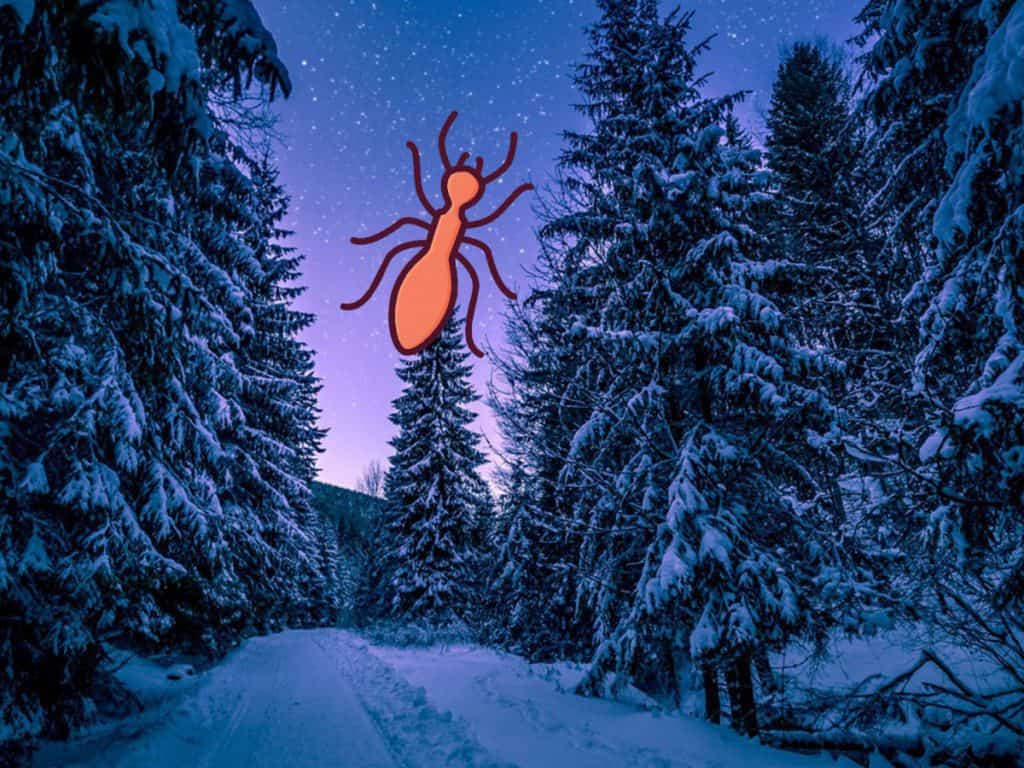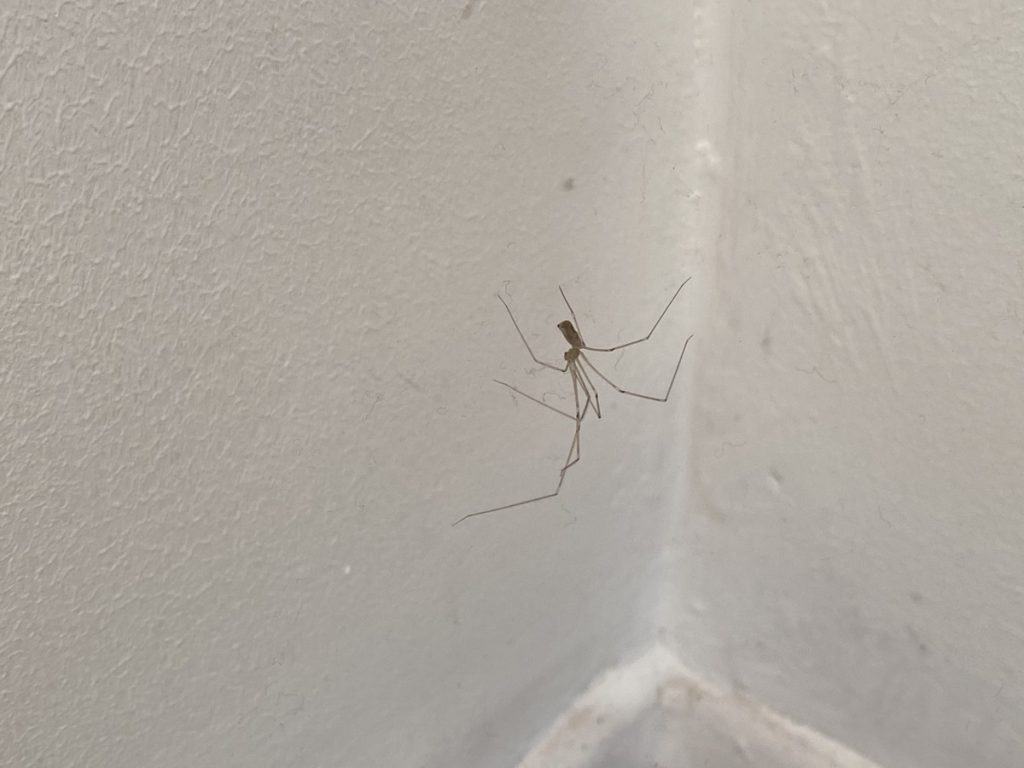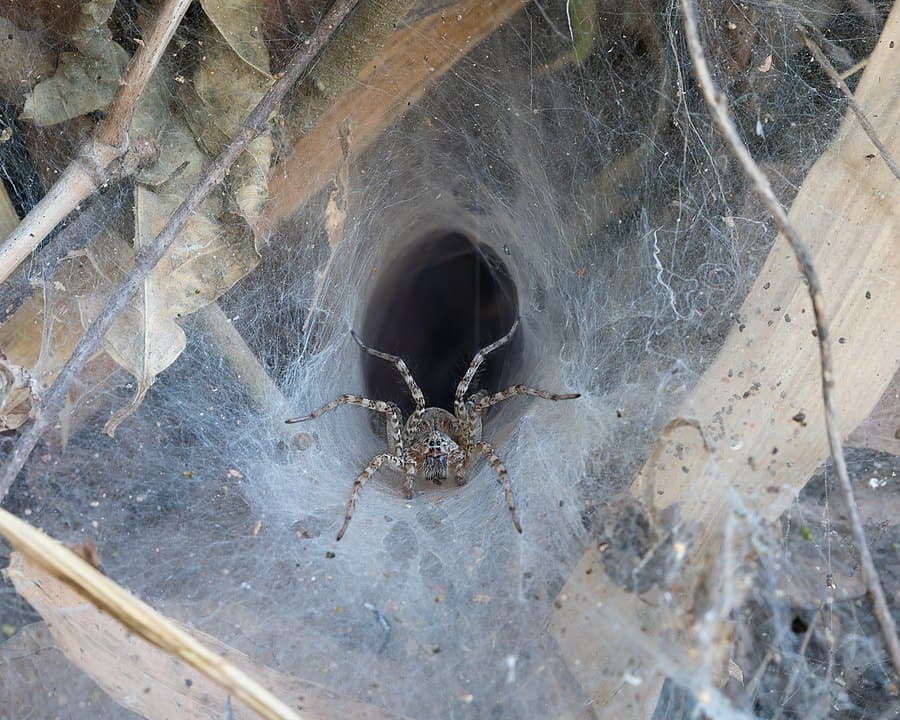
If you enjoy reading this article, why not check out our articles on Should You Kill Spiders? Short Answer: No and Do Male Spiders Spin Webs? Not What You Expected
What do spiders do in the winter?
Do spiders hibernate? Spiders hibernate in the winter depending on its species. Species like the tarantula and the fishing spider live long and tend to hibernate in the winter. Their bodies produce chemicals that slow down their metabolism. They spend their time in attics, cellars, rocks or under tree barks.
Do Spiders Hibernate?
- So to answer the question: Do spiders hibernate? The answer is that it depends on the species.
- Some young and adult spiders survive by getting themselves winterized. Others die off and let the next generation take over.
- Does extreme cold weather mean that there won’t be as many spiders? Not really.
- We have more information on what spiders do seasonally in our article When is Spider Season?
What Happens To Spiders In The Winter?
There may be less, but it depends on how well the spider has prepared their sacs to withstand the harshest winters. Preparing for winter is a natural spider instinct. They learned methods of protecting themselves and their spiderlings. Some won’t make it through the cold weather but you can bet there will be a lot of spiderlings to take their place.
Do Spiders Go Indoors To Hibernate In The Winter?

Contrary to popular belief, spiders don’t go indoors automatically, with the colder temperatures. The ones you see indoors have lived there all their lives. Thanks to the egg sacs, spiders can colonize your home. They tend to avoid humans and the ones you see tend to be males looking for a mate. Many spiders outdoors have built a tolerance to the cold and hide from any predator before they go through their winter dormancy. If you’re curious about spiders’ egg sacs, take a look at How Many Spiderlings Can a Spider Have?
What Is Hibernation?
Hibernation is a period of dormancy in the winter. In the wintertime the temperatures are too low for animals, insects and some arachnids to move around. Food is scarcer and it is hard to access due to the freezing temperatures. Hibernation is a survival instinct that many animals, some insects, and arachnids possess to slow their metabolism down and as a result, need less food in the winter. This comes in very handy because there is less food available during the winter.
What Is Diapause?
Diapause is the state of torpor that seems like hibernation and causes spiders to go dormant. The period of dormancy lets arachnids conserve energy and slow its metabolism. Are diapause and hibernation the same? They seem to be the same thing but they are not. The difference is that diapause can occur during winter and summer, while hibernation only occurs during the winter. Spiders get revived with the rise of temperature. The antifreeze that spiders also create prevents damaging ice crystals from forming and lets insects survive until they sort of thaw. Diapause is fascinating. We talk about it more in our article Where Do Ants Live in Winter?
Which Spiders Don’t Hibernate?
Not all spiders hibernate. It depends on the species. Spiders such as Argiope, different widow varieties and garden orb weavers die in the winter. They leave their egg sac behind for the next season. Some adult spiders survive by preparing a nest of silk webbing in the winter under loose barks that insulate them against the cold.
Many species have spiderlings that hatch and stay in the webbed egg sac throughout the wintertime. These spiders hibernate in rock piles and leaf litter. On milder days, they crawl around to hunt for insects which is easy to acquire in their dormant states.
Do Tarantula Spiders Hibernate?
Some spiders such as the tarantula and the fishing spider live longer than twelve months. During the colder months, they will hibernate. Young and adult spiders prepare for winter by making cocoon type insulating nests out of tree bark webbing or beneath a rock. They feel these places will keep them safe. Some types like the Wolf Spider won’t spin a web. Instead, they protect themselves by burrowing underground to stay protected from the elements.
Do spiders die in the winter?
Chances are, you imagine spiders more spinning a web against your sunshine-drenched porch rather than on Mount Everest. The truth is, not all spiders live in warmer climates. Globally, there are over forty-thousand spider species. They are found on every world continent except Antarctica. This means they are adapted for every type of weather. In most four-season states, spiders remain to be vigilant predators.
Even locally, spiders can survive extremely cold temperatures. Some can go from frigid winters to warmer summers.
Does tarantula hibernate or die in the winter?
Do spiders hibernate? Unlike mammals and human beings, spiders need insulated layers to be able to stand the temperature dip. They don’t feel discomfort when the weather gets colder. They are not attracted to warmth and they don’t shiver. The reason is that the temperature of their body can vary with the environment without harming them.
Do Spiders Hibernate And Become Dormant?

When it gets cold, spiders become less and less active, soon becoming what scientists call “diapause” or dormant. This is a state not unlike hibernation. It needs they need less prey in the wintertime. Essentially, temperatures determine their metabolism. With colder temperatures, they need less food. They also digest food slower. Naturally, spiders are not completely immune to freezing, just because they are cold-blooded. In other words, they can’t survive in the North Pole.
Do Spiders Produce Their Own Anti-Freeze?
Spiders need help to survive. Thankfully, with the change in weather, their bodies begin to slow down and change. They begin producing polyhydroxy alcohol, a type of chemical anti-freeze that works with their bloodstream’s existing fluids. This helps their bodies not form into ice. The combination of the natural antifreeze and the insulated shelter they find helps them in surviving the winter.
Spiders have evolved to develop survival instincts that help them get through every winter. Their bodies produce the right chemicals to slow down their metabolism. Hence, they won’t need as much food. They instinctively know where to find warmth and where to attach their egg sacs. When they live for more than a year, spiders can survive harsh winters without even batting an eyelash.
What Happens When Spiders Stop Hibernating?
When the weather begins to warm up, their body stops producing this chemical. They start being active once more and come out of hibernation. Then, the spiders produce eggs after mating in the spring. Their life cycle thus continues.
Spiders have cold-blooded bodily temperatures that keep fluctuating with the environment. They are classified as cold-blooded arachnids.
So, how do spiders survive the freezing temperatures?
Spiders have found many ways to survive by being resourceful. Some handle the cold months by remaining active while others hibernate.
How Do Spiders Prepare For Winter?
Spiders can sense the arrival of cold temperatures. They begin preparing for cold weather by laying eggs and mating in early autumn. Eggs can freeze and become destroyed with colder temperatures. Thus, before eggs get laid by the female, they carefully select a dark, safe place for egg sacs to protect it from the harsh temperatures of winter.
Secluded, dark locations are the best places for spiders to lay eggs. These help eggs remain warm. The space under leaves, piles of rocks and tree bark or even in your warm, nice home are excellent places for spiders to keep their spiderlings protected.
Some species have eggs that won’t hatch until the springtime. Others have eggs that hatch in the winter. Spiderlings will sometimes live communally with the eggs in the egg sac. Once the weather becomes warm enough, they set off to find new homes and eat their way out of the sac.
At what temperature do spiders die?
The North American Black and Yellow Garden Spider die when winter arrives. They only live one season. By the time winter comes, however, they already took care of the next generation. Other spider species live for more than two years.
Do House Spiders Hibernate?
House spiders can live with human beings. These types live their entire life in a barn, house or garage, or any other kind of protective structure. Spiders such as these are used to conditions indoor to continue to reproduce and mate, and to survive the winter. Generally, only a fraction of the spiders you see indoors have ever been out of doors.
Final Finding
Do All Spiders Hibernate?
Not all spiders hibernate. Some Spiders don’t hibernate in the winter. Instead, they remain active. Most remain hiding under other items on the ground and under leaves to absorb as much warmth from the geothermal heat and decaying debris as they can. These types are not as active in the col but will come out on warmer days in the winter. Sometimes, they can be seen scurrying across the snow.
They can live during winter months because their digestion and metabolism are slower in colder weather so they don’t need as much food. Depending on what species they are, spiders have all the instincts and physical makeup to withstand harsh winters in time for spring. The ones that don’t hibernate are the ones they don’t live long enough to need to survive winter.
Spiders need gradual exposure to non-lethal colder temperatures over many days for building up a tolerance. The bad news is that homeowners don’t get a lot of options from spiders. Homeowners can’t do anything but tolerate them. On the other hand, spiders tend to be harmless and stay out of the way most of the time.
If you enjoyed reading this article, why not check out our articles on Can Spider Fangs Grow Back? Let’s Find Out and What Do Spiders Eat? The Complete Guide
Recent Posts
Tiny Black Bugs in Bathroom NO WINGS: What They Are and What to Do!
Finding tiny black bugs in your bathroom can be uncomfortable, to say the least. Especially if they are persistent, or they appear in very large numbers, which they often like to do. When it...
Tiny Black Bugs in Plant Soil - What Are They & What To Do About It
A short horror story: You get a new houseplant. You do your best to take care of it. You’ve ensured that it has the right soil, the right amount of sun, it gets enough water. And then one day, you...

